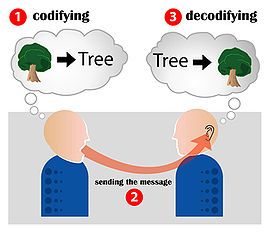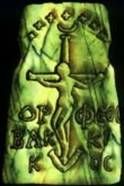
Now
that we understand that the hate group has evolved from mere hate
group to Orwellian nightmare we can analyze it more effectively. So far
here are the indications:
Use of terms:these are all found in past posts on this blog so you can just go down the page and find them.
Imaginary: indicating the status of belief in God
Delusion: Also used of alleged fictional status of God belief.
Cult: used as synonym for all religious groups even the most popular
Description of the making of God arguments:
Trying to usurp science and reality to stick in your deity is dangerous.
superstition: used defined as Christianity and other religious belief.
Definition of Superstition
I have recently been examining all the known superstitions of the
world, and do not find in our particular superstition (Christianity) one
redeeming feature ...
www.brainyquote.com/words/su/superstition226408.html - 14k - Cached - Similar pages -
The
same kind of recursive and circular statement I just got through
exposing. What makes it superstitious? Because it's religion. What makes
religion superstition? Because it' superstition.
Defining "Fre Thinkers" As those who agree with atheist ideology:
True
free thinkers are those that can speak and think with accuracy and
honesty. As a scientist, I pride myself on being able to read and
understand the natural world and everything it has to offer. Not all of
it is 100% right, but I consider the 95% to be good enough.
Defining opposition to Atheist control as "anti-free thinking."
Freedom
becomes slavery and slavery becomes freedom. Now that we know this is
the true nature of atheism, reductionism and all the other isms such as
scientism that go hand in hand with the hate group, we can understand
the danger is no just to Christianity, not just to religions, but to
all people who want to think for themselves.
Atheism constitutes a clear and present danger.
This
time from T WEb. An atheist makes the statement that God is "only
imaginary." I put up a great argument that belief in God is rationally
warranted and that is certainly strong enough to be thought of as more
than "Imaginary." The he tries to soft peddle the insulting
implications, which I find is an Orwellian use of language.\
Me: that's more than imaginary, remember the title of the thread?"
him: Only if there happens to actually be a God.
My
argument is that we have strong reasons to bleieve there's a God. He
wants to be able to continue the insulting connotations while denying
that he means them. But when I claim that string theory is imaginary
too what does he say?
Im originally posted by JimL
Neutrino's are detectable and are known to exist, there is nothing imaginary about them,
Meta:
atheists just really have a problem with understanding what is said
don't you? God is real and can be detected. What the person I was
responding to said about the meaning of imaginary would apply to
anything that is
not directly and unarguably proved.
Neutrinos are not directly demonstrated. they are not directly
observed. You can detect them but only by their effect upon other
particles. There still remains no direct picture of one. They cannot be
directly observed.
We can detect God by his effects upon people, that's what RE is. It's God's effect, the trace of God.
Jim L
and
string theory is just that, a theory, based on the physics of the
natural world, whereas God is merely an unscientific concept that gives
to us an imaginary explanation as to the meaning of it all.
Again,
Science is not the only form of knowledge. Understand? science is not
the only form of knowledge. that means it doesn't have to be science to
be true. That means bad mouthing God by saying "that's not scinece is
not an argument! understand now? that's not a point in your favor. it's
meaningless.
it does not make God imaginary. Just because
something is not science doesn't mean it's imaginary. Logic is not
science, logic is not imaginary. Phenomenology is not science,
phenomenology is not imaginary. Understand now?
You are trying to privilege your position with words.
Meta
you are special pleading. You are trying to say that science is the
only form of knowledge so therefore anything that is scientific is
automatically redeemed from not having direct proof. But an idea that is
not a scientific idea, if not proved directly must be imaginary.
That's crap.
You do not have the right to privilege our
position such that anything you say is exempt form direct proof but
anything I say direct proof is automatically required.
Neutrinos and string theory cannot be proved directly no one thinks
that makes them imaginary. God can be known by his effects and by one's
understanding of being, so God is not imaginary.
Meta
Yes I sure and I have.(verify SN) See the threads I put down on how
atheists have the wrong idea of the supernatural. The religious
experience studies and the effects of navigation in the world are
supernatural, a prori. they fit exactly what the original concept was
about.Its' a Christian theological concept atheists do not have the
right to define it!
Jim L
and
so you are left with nothing but the imagination with which to
construe an ultimate reality or God. Whether God exists or not you can
only imagine.
you are doing it again, give me some
proof that anything that is not science is imaginary? why do you think
you get to pronounce that? Science doesn't say that. Show me the
scientific data that proves that?
Moreover, My argument is based
upon 300 scientific studies and you don't have any. I can verify the
SN by science because the first argument is the supernatural.
Supernatural refers to God's power to transform lives, that's exactly
how the word was first. That's what it means that's what these 300
studies prove. you don't have any studies. you have no studies.
score, 300 to 0.
Theists = 300 studies proving our position
ahteist= 0 studies proving your position.
Meta I
am left with 300 empirical studies which show that the experiences
that led to the creation of religion are real, they are experiences of
something, they fit the criteria we use to determine reality so we have
every right to think of them the effects of something real; they are
about god we should assume God is that "something" that is real.
Jim L
not direct proof but more than imagination!
Metathey
don't have to be direct proof. you have offered no data or any sort of
argument to prove that these are the only choices, either imaginary or
totally proved directly. That's a silly idea. That's not science and
it's not logical it's stupid. do you hear me its' stupid. got it? it's a
dumb idea.
you are making extremely statements and you can't back them up.
I have studies showing an innate concept of God in the mind of
humans. That means God had to put it there because evolution can't.
[not direct proof but more than imagination!
did
you read the op? do you ever read anything? The point in the op is it
doesn't have to be direct proof because it rationally warranted. do you
understand that phrase?
I said in the first post that my point
is not that God is directly proved but that it's rational to believe.
So you come along and say "not direct proof" so what does that do to
the argument? It agrees with it so it must no effect it at all do you
see that?
I never defined imaginary thus. It merely means the construction of concepts in the mind with no definite reality.
So
now it comes out that you don't understand what is meant by
"connotations?" Atheists are indeed ignorant. It's a connotation of
ignorance and stupidty and childishness if not why are you not willing
to say that string theory is imaginary?
Hawkings numbers are imaginary how does that make you feel?
Jim l
You can't prove it directly because whether true or not for you, like it or not, God is only a concept in your own mind.
Metawhat did I say about proving things directly? when are you going to start addressing the arguments?







